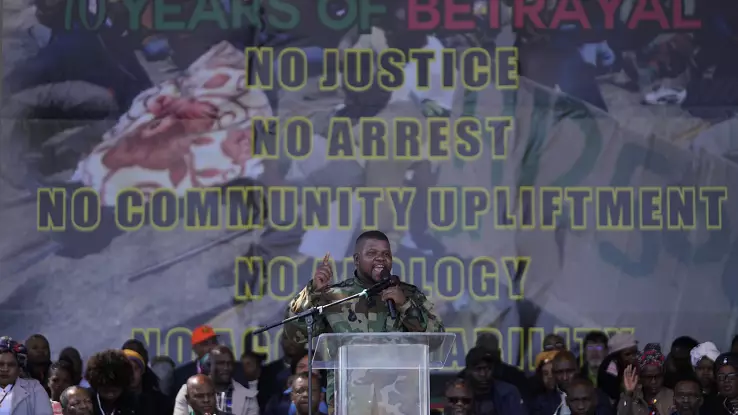S. African miners mark 10yrs of Marikana massacre
Thousands of people gathered in the South African town of Marikana on Tuesday to mark a decade since dozens of striking workers were killed in the worst act of police violence since the end of apartheid.
On August 16, 2012, 34 people were killed and 78 injured when police opened fire on platinum mine workers who had gathered on a hill near the mine to demand better wages and housing.
To this day, justice for miners and their families remains a distant prospect.
“Ten years has passed now, standing all the time on this hill, asking for answers on who is it that sent the police to come and kill our men, and injured them on this hill, while they were here looking just for money from the employer….that’s just our first question”, said the Families Representative of the Marikana Women’s Group addressing a crowd.
An official inquiry placed much of the blame for the deaths on police tactics.
It also cleared senior government officials of any blame.
To this day, still no one has been charged.
“This is not an easy thing, it is very hard and it weighs on us. We need to be strong men, in the end the truth will come out, even when we are no longer there, as to who was responsible for the spilling of blood in Marikana, those responsible for making us a laughing stock” denounced Mzoxolo Magidiwana, Marikana shooting survivor.
Many miners wearing union T-shirts participated in the event, along with opposition officials.
“We are living here like pigs as you can see for yourself, there’s no roads here, nothing, there’s no change at all, Sibanye is not looking after us”, complained Leaboa Akgosi, Marikana resident and mine worker.
Authorities claim to be still finalising dozens of compensation claims, having already paid almost 76 million rand ($4.6 million) to the victims’ families.
Wages in the mining sector have increased by 86.5 percent since 2012, the Minerals Council of South Africa, an industry group, said in a statement, adding that companies have worked to ensure that the events of Marikana “never happen again”.






















































